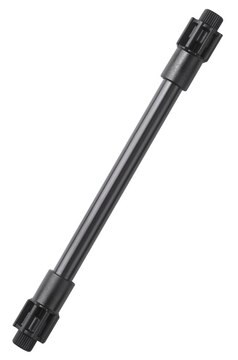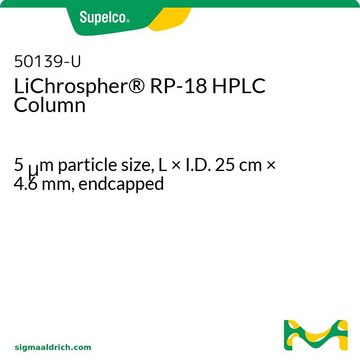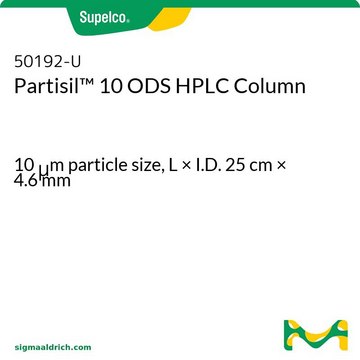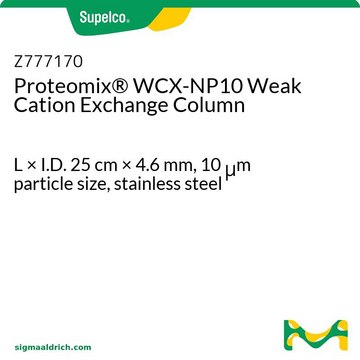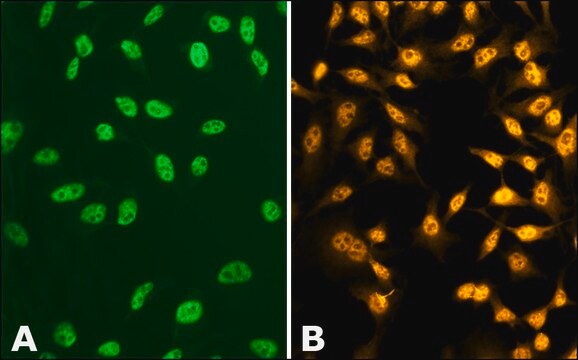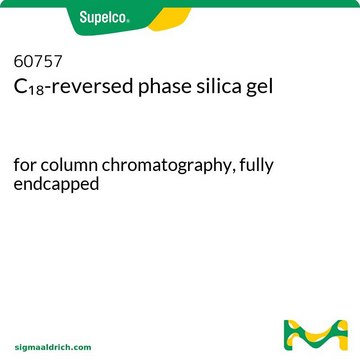1.52250
Chromolith® WP 300 Epoxy (monolithic) HPLC Columns
L × I.D. 100 mm x 4.6 mm HPLC Column
Synonym(e):
Chromolith® WP 300 Epoxy 100-4.6 HPLC column
About This Item
Empfohlene Produkte
Produktbezeichnung
Chromolith® WP 300 Epoxy, L × I.D. 100 mm x 4.6 mm HPLC column
Materialien
PEEK column
Qualitätsniveau
Produktlinie
Chromolith®
Chromolith®
Leistungsmerkmale
endcapped: no
endcapped: no
Verpackung
1 ea of
Kennzeichnungsgrad
5-6% Carbon loading
Parameter
2 - 60 °C temp. range
2-60 °C temp. range
200 bar pressure
200 bar pressure
Methode(n)
HPLC: suitable
HPLC: suitable
LC/MS: suitable
Säule L × ID
10 cm × 4.6 mm
Matrix
monolithic silica
monolithic silica
Aktive Matrixgruppe
Epoxy bonding phase
Epoxy bonding phase
Porengröße
2 μm macroporosity
2 μm macroporosity
30 nm mesoporosity
30 nm mesoporosity
pH Betriebsbereich
1.5-7.5
1.5-7.5
Lagertemp.
no temp limit
Suchen Sie nach ähnlichen Produkten? Aufrufen Leitfaden zum Produktvergleich
Allgemeine Beschreibung
Potential applications: attach trypsin to obtain HPLC column-protein digestion reactor; attach protein and measure other protein interaction with the attached one; attach any chiral selector to obtain a chiral column; attach any affinity ligand to obtain custom made affinity column, etc.
Chromolith® WP 300 Epoxy 100-4.6 columns are made of monolithic silica with a characteristic bimodal pore structure.
Key Benefits:
- Easy to perform immobilization of ligand opens up limitless customization options
- Monolithic format allows for high flow rates at low backpressure, enabling high throughput
Learn more:
Brochure: Race through your Separations on Any System. Chromolith® Monolithic Silica HPLC Columns
Chromolith® WP 300 Epoxy is available in 2 mm I.D. providing improved efficiency, sensitivity, and enhanced MS-compatibility.
Flyer: Create Your Own Column Chemistry - Chromolith® WP 300 Epoxy 2 mm I.D. HPLC Columns
All Supelco HPLC Columns, including monolithic Chromolith® columns, are fully compatible to all HPLC and UHPLC Instruments.
Supelco HPLC Products: The Best Choice for Any LC Instrument
Rechtliche Hinweise
Sie haben nicht das passende Produkt gefunden?
Probieren Sie unser Produkt-Auswahlhilfe. aus.
Analysenzertifikate (COA)
Suchen Sie nach Analysenzertifikate (COA), indem Sie die Lot-/Chargennummer des Produkts eingeben. Lot- und Chargennummern sind auf dem Produktetikett hinter den Wörtern ‘Lot’ oder ‘Batch’ (Lot oder Charge) zu finden.
Besitzen Sie dieses Produkt bereits?
In der Dokumentenbibliothek finden Sie die Dokumentation zu den Produkten, die Sie kürzlich erworben haben.
Verwandter Inhalt
Die Hochleistungsflüssigchromatographie (HPLC) kann zur Trennung und Identifizierung verschiedener großer Biomoleküle wie Proteine und Peptide in einer Probe verwendet werden. Sie basiert auf dem Durchpressen einer Probe mit einem Lösungsmittel (mobile Phase) bei hohem Druck durch eine mit Sorbent (stationäre Phase) gepackte Säule.
HPLC separates and identifies large biomolecules like proteins and peptides by pumping the sample through a sorbent-packed column.
Analytical Chromolith® HPLC columns for Bio applications, 300A mesopores: RP-18, RP-8, RP-4, Prot-A, Epoxy
Unser Team von Wissenschaftlern verfügt über Erfahrung in allen Forschungsbereichen einschließlich Life Science, Materialwissenschaften, chemischer Synthese, Chromatographie, Analytik und vielen mehr..
Setzen Sie sich mit dem technischen Dienst in Verbindung.